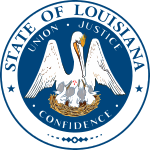| ||||||||||||||||||||||||||
All 10 Louisiana votes to the Electoral College | ||||||||||||||||||||||||||
|---|---|---|---|---|---|---|---|---|---|---|---|---|---|---|---|---|---|---|---|---|---|---|---|---|---|---|
| ||||||||||||||||||||||||||
 Parish Results
Roosevelt 70-80% 80-90% 90-100%
| ||||||||||||||||||||||||||
| ||||||||||||||||||||||||||
| Elections in Louisiana |
|---|
 |
|
|
The 1932 United States presidential election in Louisiana took place on November 8, 1932, as part of the 1932 United States presidential election. Louisiana voters chose ten[2] representatives, or electors, to the Electoral College, who voted for president and vice president.
Ever since the passage of a new constitution in 1898, Louisiana had been a one-party state dominated by the Democratic Party. The Republican Party became moribund due to the disenfranchisement of blacks and the complete absence of other support bases as Louisiana completely lacked upland or German refugee whites opposed to secession.[3] Despite this absolute single-party dominance, non-partisan tendencies remained strong among wealthy sugar planters in Acadiana and within the business elite of New Orleans.[4]
Until the rise of Huey P. Long, post-disenfranchisement Louisiana politics was dominated by the New Orleans–based “Choctaw Club”,[5] which overcame Socialist, Wobbly, and Progressive challenges from the outlying upcountry, Imperial Calcasieu and Acadiana regions between the late 1900s and early 1920s.[6] The three presidential elections between 1916 and 1924 saw a rebellion in Acadiana over sugar tariffs and Woodrow Wilson’s foreign and domestic policies; however, the nomination of Catholic Al Smith in 1928 rapidly restored their Democratic loyalty without causing significant upheaval in the remainder of the state, which was too focused on control of black labor to worry about Smith’s Catholicism.[7] The effects of the Great Depression were extremely severe in the South,[8] which had the highest unemployment rate in the nation. Many Southerners blamed this on the North and on Wall Street, rejecting Hoover’s claim that the Depression’s causes were exogenous,[9] and this ensured that the previous decades Acadiana revolts would not be repeated.
Louisiana was won by Governor Franklin D. Roosevelt (D–New York), running with Speaker John Nance Garner, with 92.79 percent of the popular vote, against incumbent President Herbert Hoover (R–California), running with Vice President Charles Curtis, with 7.01 percent of the popular vote.[10][11]
By percentage of the popular vote won, Louisiana was Roosevelt's third-best state, behind only South Carolina and Mississippi.
- ^ "United States Presidential election of 1932 — Encyclopædia Britannica". Retrieved January 20, 2019.
- ^ "1932 Election for the Thirty-seventh Term (1933-37)". Retrieved January 20, 2019.
- ^ Phillips, Kevin P. (November 23, 2014). The Emerging Republican Majority. Princeton University Press. pp. 208, 210. ISBN 9780691163246.
- ^ Schott, Matthew J. (Summer 1979). "Progressives against Democracy: Electoral Reform in Louisiana, 1894-1921". Louisiana History: The Journal of the Louisiana Historical Association. 20 (3): 247–260.
- ^ Wall, Bennett H.; Rodriguez, John C. (January 28, 2014). Louisiana: A History. John Wiley & Sons. pp. 274–275. ISBN 978-1118619292.
- ^ Collin, Richard H. (Winter 1971). "Theodore Roosevelt's Visit to New Orleans and the Progressive Campaign of 1914". Louisiana History: The Journal of the Louisiana Historical Association. 12 (1): 5–19.
- ^ Wingo, Barbara C. (Autumn 1977). "The 1928 Presidential Election in Louisiana". Louisiana History: The Journal of the Louisiana Historical Association. 18 (4). Louisiana Historical Association: 405–435.
- ^ Lewinson, Paul (1965). Race, class and party; a history of Negro suffrage and white politics in the South. pp. 167–168.
- ^ Ritchie, Donald A. (2007). Electing FDR: the New Deal campaign of 1932. Lawrence, Kansas: University Press of Kansas. p. 143. ISBN 978-0700616879.
- ^ "1932 Presidential General Election Results — Louisiana". Retrieved January 20, 2019.
- ^ "The American Presidency Project — Election of 1932". Retrieved January 20, 2019.

